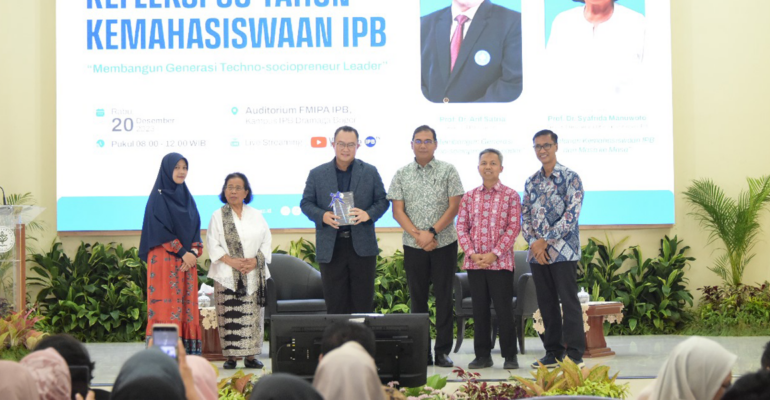IPB University Invites Reflection on the Evolution and Achievement of IPB Student Organisation After 60 Years

The journey of IPB University from the past to the present has not escaped the important role of students. For this reason, IPB University held an event Reflection of 60 Years of Student Organisation: Building a Generation of Techno-sociopreneur Leader (20/12).
The reflection was delivered by Prof Arif Satria, Rector of IPB University and Prof Syafrida Manuwoto, the main author of the book History of IPB Student Organisation.
Prof Syafrida told the story from the perspective of the history of IPB student organisation which consisted of three parts. These parts are the history of the student movement, the reference regulations for the guidance of student organizations (ormawa) and the pre-IPB period.
“Student Organisation of IPB University has reached a proud peak of achievement, especially with the Abdidaya Ormawa award for three years. This achievement is an emphasis on community service and empowerment that already exists in the DNA of IPB University citizens,” she said.
The book History of IPB Student Organisation contains past records related to student life in the university environment, especially IPB. Readers will also be taken to see a flashback of the pre-IPB period, through The New Order (ORBA) to the present.
“One of the functions of seeing the history of student organisation from time to time is to recognize the identity of students as individuals, as citizens of IPB University, as citizens of society and as a nation. The spirit of struggle needs to be built in the development of student organisation of IPB University beyond its 60 years of age,” she said.
Prof Arif said that the compilation of the IPB Student History book was very important. This is because the book is the basis for visualizing the establishment of the Museum and Gallery of Future IPB. According to him, the record of the past can arouse the enthusiasm of the current generation of students to take part in ormawa globally.
“The spirit of students to participate in committees and international activities must continue to be encouraged in order to be able to kick off the role of IPB University at the global level,” he explained.
He also shared his life experience during college. His enthusiasm to succeed in pioneering the International Association of Students in Agricultural and Related Sciences (IAAS) is an exemplary form of past investment.
His efforts were based on his intention to create new history and build new milestones as a student. The Rector said that students need to have similar intentions in order to create a big positive impact through various forms of legacy.
“Students in the third world are only educated people who have complete information so that student involvement in the democratic process is very important,” explained Prof Arif.
The maturity of democracy requires the role of students who have techno-sociopreneur skills. In the next 20 years, he continued, Indonesia still needs a variety of democracies, one of which is initiated by student organizations.
“Therefore, we have established the K2020 curriculum policy that makes student organizations a part of the curriculum and learning outcomes so that we can create graduates who are leaders and extraordinary achievements,” he said. (MW/Rz) (IAAS/MKY)



